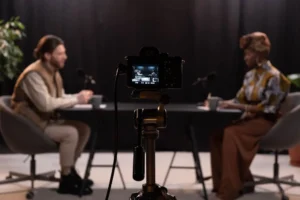The podcasting world has come a long ways in the past few years. Shows have grown exponentially in popularity, advertisers are coming into the mix, and new shows are starting every day.
But, there is still one central question that almost everyone asks when they’re just starting a new show: “How can I record good sounding audio?”
For years the answer to this was a simple one. Using Skype along with a paid add-on called Call Recorder for Skype gave you a great way to connect with your guests or cohost remotely, and was relatively cheap and easy to set up.
But anyone who has used Skype over the past year or so knows that a lot of things have changed, and unfortunately the platform continues to get more and more bugs in it, leaving many of us podcasters to wonder if there is a better way.
And the good news is, there are several great Skype alternatives out there that will give you great sounding audio for your next remote interview.
We’re going to walk through a few options that are great alternatives to Skype for podcasting, many of which are entirely free, and some which carry a small monthly cost.
But first, let’s establish what makes a good recording:
- Clear audio quality without any dropout, static in the line, or other artifact – garbage in, garbage out as they say. Getting a good audio recording up front is key
- Ability to record the audio on multiple channels if you have one or several guests – this is the most important part for post-production. Editing tracks separately is the easiest way to get good sound in the end.
- Lossless, or as close to as possible, recording fidelity – something at least as good as the mp3 settings you’ll use to publish your show.
- Syncing multiple tracks – it is great, although not absolutely essential, if you can record those multiple tracks all at the same time so they’re all in sync when you go to edit.
Now that we’ve established what a good recording should look like let’s go through a few of the most popular Skype alternatives for podcasting.
Zencastr
Developed specifically for podcasters and to solve the problem of unreliable internet connections Zencastr is one of our favorite tools for conducting remote podcast interviews. Zencastr works right in the browser so you don’t have to download any additional software.
Maybe the best thing about Zencastr, and what differentiates them from all other tools is that they create what in the audio world we call a “Double Ender”, where they records multiple channels all locally, eliminating the dependency on the speed and stability of your internet connection.
Your side of the conversation, and the side of each of your guests all get recorded separately, and then those tracks are synced up, and all sent up to your Dropbox folder for you to edit later.
Zencastr founder Josh Nielsen had this to say in a recent chat I had with him:
When you are recording a remote guest for your podcast, the only way to avoid VoIP distortion and guarantee crystal clear audio is to record your guest locally on their end. It can be quite a hassle to teach each guest how to use audio recording tools and then send you the audio files. Zencastr enables you to perform a ‘double-ended’ recording by simply sending a link to your guest and pressing record. You will be automatically connected in a VoIP call and each participant will be recorded locally in studio quality. Afterwards, you can then choose have your show automatically mixed and produced into a professional quality track that is ready for publishing.
Overall we really like using Zencastr, and have done so both as guests of other podcasts and as the podcast organizer. It works great, is easy to set up, and on paper at least should give you the best audio quality since it does not rely on your internet connection but rather records locally on your computer.
Josh was gracious in offering us a special discount code to try out Zencastr. Use promo code CASTOS when you sign up to get 20% off your first 3 months service. A great deal, thanks Josh!
Zoom.us
In the world of conference calling solutions there are a few players that stand out from the crowd in terms of reliability, ease of use, and feature set that we podcasters need. One that really shines here is Zoom.
Zoom is a Free conference calling solution, with some paid upgrade options of course, but the core tool is entirely free and solves many of the problems that we may have as podcasters looking to conduct remote interviews.
The thing that I, and other podcasters, love about Zoom is the reliability of the connection. When something like Skype may cut in and out and you have difficulty getting a good recording with potentially shoddy internet Zoom saves the day and delivers a great sounding recording, even if your internet isn’t the fastest or most stable.
When setting up Zoom for podcasting the one setting that you’ll need to change is configuring for each guest on the call to have their side of the conversation recorded separately.
We talked about the need for this a bit at the beginning of this article, but the point here is that you want to be able to edit out my side of the conversation if while you’re talking my dog is barking, or I may want to edit out your side of the conversation when I’m talking if the garbage truck decides to empty that dumpster across the street in the middle of our chat. Either way we can do this without affecting the other channel(s) if they’re all recorded separately. If they’re all recorded together than any changes you make affect all of our voices.
One additional perk of using Zoom is that you can simulcast directly from Zoom to Facebook Live and YouTube. So if you’re into live podcast content, this may be the way to go
How Do You Record Remote Podcast Interviews?
Now a question for you. What tools do you use to record your podcast interviews? If you’ve been using Skype and Call recorder and it’s going well, then that’s great. If you’re just starting out or having issues with Skype then we’d definitely recommend one of the two Skype alternatives we highlight above. We’ve used both extensively and both work great.




Thanks
What of the video?
Does zoom record video separately?